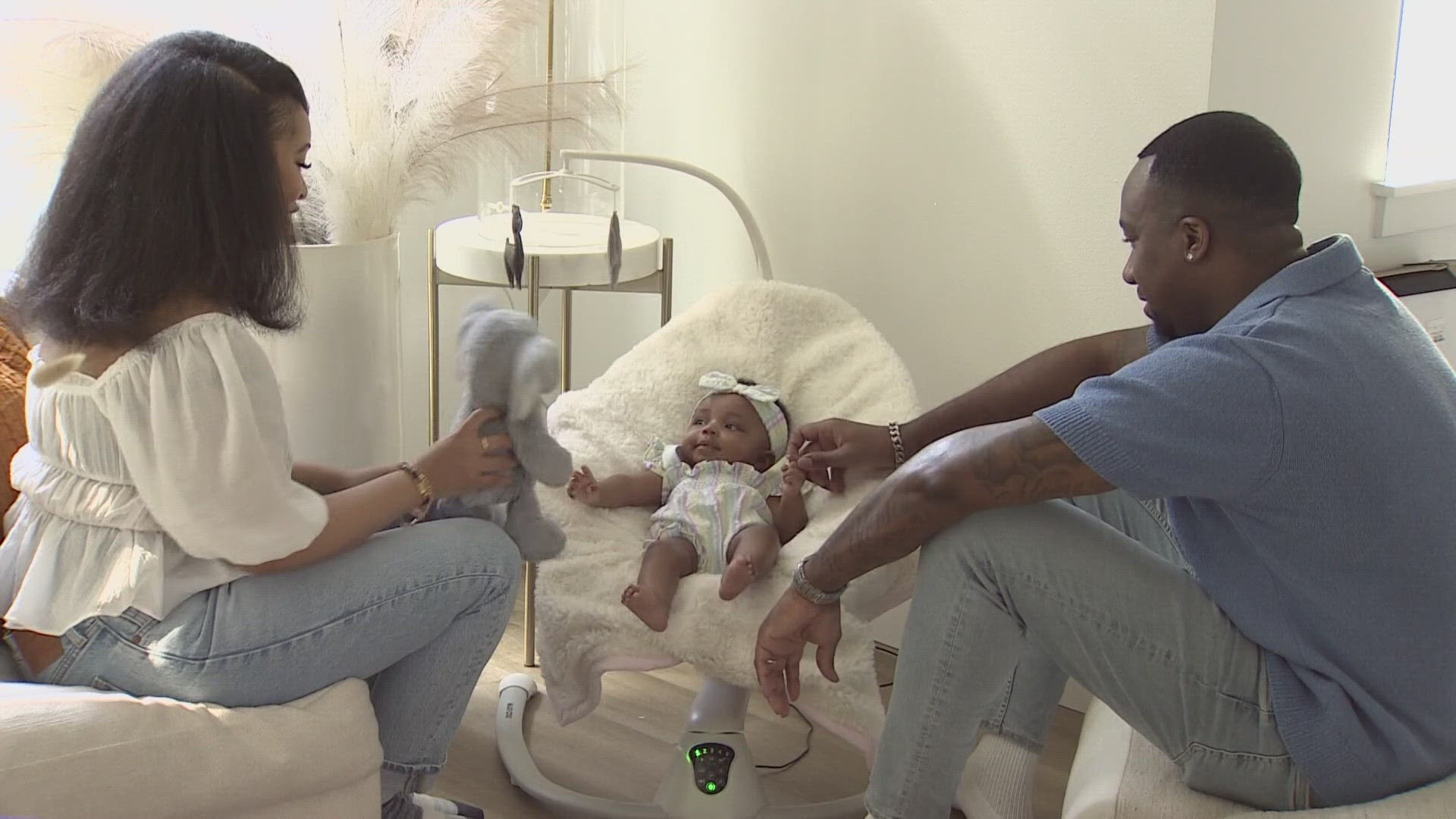SEATTLE — A recent report from the Centers for Disease Control and Prevention (CDC) revealed that maternal deaths in the United States spiked in 2021.
For Black women, the risk is even higher. They are two to three times more likely to die than white women.
The untimely death of three-time Olympic medalist Tori Bowie this spring reignited the conversation. Bowie, who was 32 years old at the time, died from complications from her pregnancy.
“We have the brilliance, the wisdom, the curiosity to actually have a better health system. But we need a coalition of the willing who actually believe that are willing to build it.”
-Monica McLemore, interim director for the University of Washington's Center for Anti-Racism in Nursing
“If you’re not being heard. If people believe you have thicker skin, if they're not treating your pain, all of the sort of lies and myths that have been told about Black people within the context of health care and health service provision, they get perpetuated,” said Monica McLemore, the interim director for the University of Washington's Center for Anti-Racism in Nursing. “That’s how we get to a situation where we're two to three times more likely to die during pregnancy and childbirth.”
McLemore said there is another fact that is being ignored.
“Let's talk about Serena Williams, she has a really great case study in 'Oh, I didn't die, but almost did,'” McLemore said. “So, we don't talk about near misses.”
Back in 2018, the tennis star revealed that she had major complications after she gave birth. Williams suffered from a pulmonary embolism and blood clots in her lungs and legs.
“I think she really is using her platform to get people to understand look if this happened to me, somebody who is paid to understand how my body works," McLemore said. "That’s the other irony of her case. She knows her body better than anybody else because she is a multimillion-dollar paid athlete, and nurses still didn’t listen to her."
In the latest CDC report on maternal morbidity, about 50,000 to 60,000 pregnant women face serious complications each year.
McLemore said part of the solution is more legislation and diversity within the medical industry.
“As long as we still have the same workforce that's causing harm in place, that didn't want to be a part of the solution, that requires some intervention,” McLemore said. “We need some training, we need some education, we need some people to get fired. So, it's a lack of political will and it's trying to solve a structural problem with individual solutions.”
Washington is one of six states that has legislation requiring some form of implicit bias training for healthcare workers.
“It comes back to this; how do we develop not just skills for people to pause and to listen?" McLemore said. "But what’s the accountability when they don’t? That’s the other piece I don't think has really been built out from an anti-racism perspective in health care. For too long, especially around the patient safety movement and a whole variety of things, we did not tie that to human resources and hiring and firing. At some point, we have to start to say, we can implicit bias training people all we want, but if we continue to see that behavior, then there have to be consequences for that behavior.”
McLemore said most people will survive their pregnancy and birth, but it shouldn't just be about survival; it should be a joyous time.
“You want to plan out with your team, exactly what you want and how that experience should go,” McLemore said. “Really be vocal. I tell Black families, use your social media because that’s been very helpful in bringing attention to things. Make sure your family is very aware and your community is very aware of what you want and what you need. You can have an out-of-hospital birth, you can have a home birth, you can birth with a midwife at a birth center, you can do all of those things. You have options, you have choices, and you can do those things safely with justice and joy.”

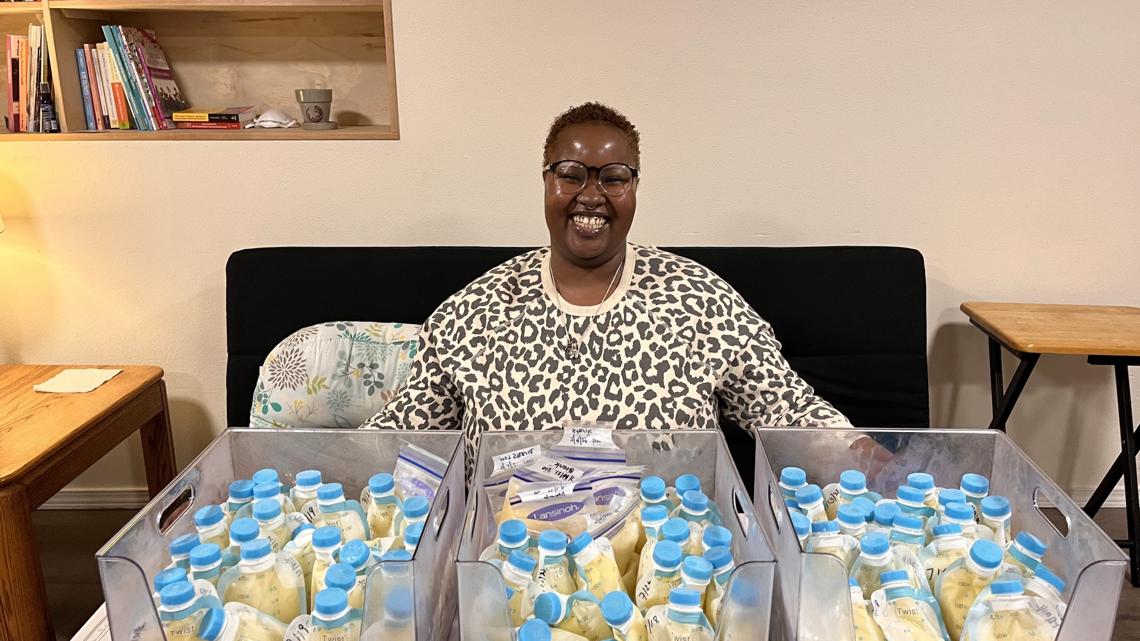
“I don't want to die. That was literally the main part of hiring me was just, I don't want to die. They wanted that advocate that could be there, that person that had the knowledge.”
-Jazmin Williams, BLKBRY Founder
There is strong evidence that shows that having doula care can decrease the risks of pregnancy.
According to the March of Dimes, pregnant women who use doulas are two times less likely to have birthing complications.
Jazmin Williams is the founder of BLKBRY, a doula center in Burien. She is raising funds to open the first Black-owned birth center in the state of Washington.
After her own traumatic births, she became a doula to support Black women. Shortly after giving birth to her first child, she was forced to have an emergency uterine procedure called a dilation and curettage (D&C).
“I had to be rushed to the emergency room the day I was discharged," Williams said. "I had a D&C without anesthesia done on me, by a cis-gendered white male doctor. He didn't tell me what he was about to do. He just told me to lie down and did the D&C. He got mad at me for being discharged. But it was my first birth. I didn't know what I was going through. I didn’t have anything to compare it to. Nobody else that I knew had went through that. That’s why doulas are important because we have that education.”
Williams said she is tired of hearing about the statistics because Black women still must prove this is happening and relive their trauma.
“We know because we’re sharing our stories," Williams said. "We know that this is happening. Part of that is why we need to stop being more than just a number and really having folks hear what we’re going through and letting us be the ones to lead in that change as well. But it takes everybody to do the work to make that change.”

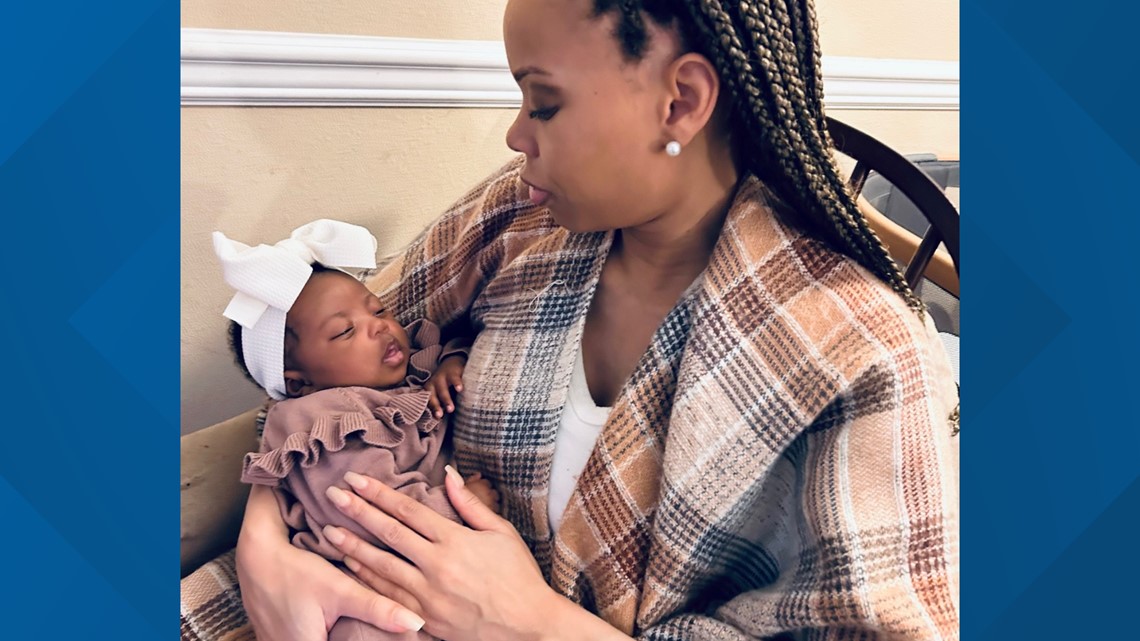
“I feel like doulas, especially for Black people, are a necessity. They’re not a luxury. We are at risk for a lot.
-Damarria Davis, owner of Divine Doula Birthing Services
Damarria Davis is the owner of Divine Doula Birthing Services. She said she was called to birth work after her own experiences. She suffered a miscarriage in 2020.
“I hemorrhaged and my life was actually saved by Swedish Medical Center,” Davis said. “At that point, I was working in a very highly visible job within medical insurance, health and welfare. I felt like I wasn't really fulfilling my purpose in life, and I wanted to do was something that was more fulfilling, more something that brought me joy.”
Davis has five children, her oldest is 19 and the youngest is less than a year old. She said having a doula and being a doula has contributed to the success of her birth journey.
“I think it's important that we receive congruent care, culturally congruent care in a hospital environment," Davis said. "I had a nurse at Swedish, her name is Ty. I had braids in my hair at the time. I was just getting in the tub and my contractions were really intense. My braids were coming down and she took my braids, and she just wrapped him up. That's something that simple. I don't think anybody else would have done that. She walked me through everything that was happening. She educated me on why certain interventions were being suggested.”
Davis said if women fail to conduct adequate research, they end up with the lowest quality of care at the highest expense to themselves.

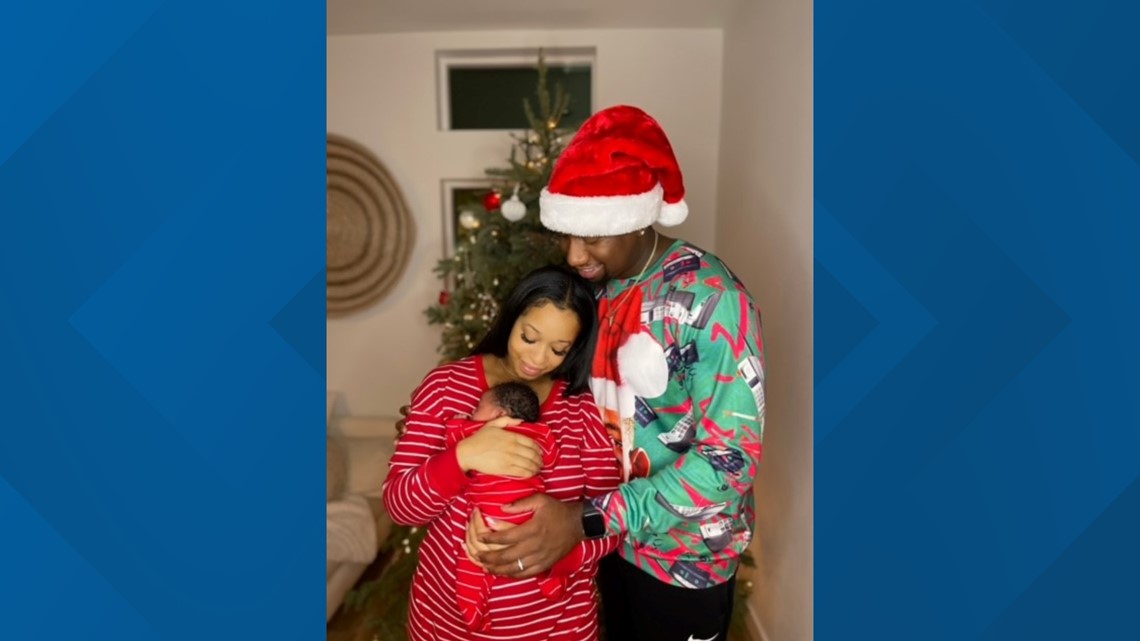
“The statistics are real, being a Black woman is real, and it is the most liberating powerful experience, but it is also very scary.”
-Chelsea Ghant-Hopkins, mother
Chelsea Ghant-Hopkins and her husband Mark are experiencing the joys of parenthood. Their daughter Harper was born in December 2022. From the moment she found out they were expecting Chelsea started educating herself because she knew the statistics concerning Black women.
“I've had experiences in the past not related to pregnancy, where I didn't always feel heard, for pain that I was feeling or things that I was experiencing in my body,” Ghant-Hopkins said.
Ghant-Hopkins was able to build her sense of community to prepare with her husband. She vetted her OBGYN before deciding to move forward and went into the journey empowered.
“My faith carried me," Ghant-Hopkins said. "But knowing that I was a woman and then a Black woman in Seattle, a predominantly white city, it definitely scared me. I didn't have not one Black doctor and not one Black nurse. I didn't have a doula. So, I was a bit apprehensive about the fact that will they hear me? Will they understand my journey when I go into my checkups?”
Overall, Ghant-Hopkins said she had a beautiful pregnancy. Before giving birth, she printed out seven birth plans.
“I put them in the room, the doctor had one, Mark had one, my mom had one," Ghant-Hopkins said. "So, in the event that I wasn't able to advocate for myself, they could. We even rehearsed, the tone that you would want to speak to the doctors if, in fact, something was to go away.”
Ghant-Hopkins said expecting mothers should go into their pregnancy journey feeling empowered.
“Do as much research as you can and bring your community along to advocate with you and for you,” Ghant-Hopkins said. “At the end of the day, this is your little being that's inside of you. You're the only advocate for your body and for your child."

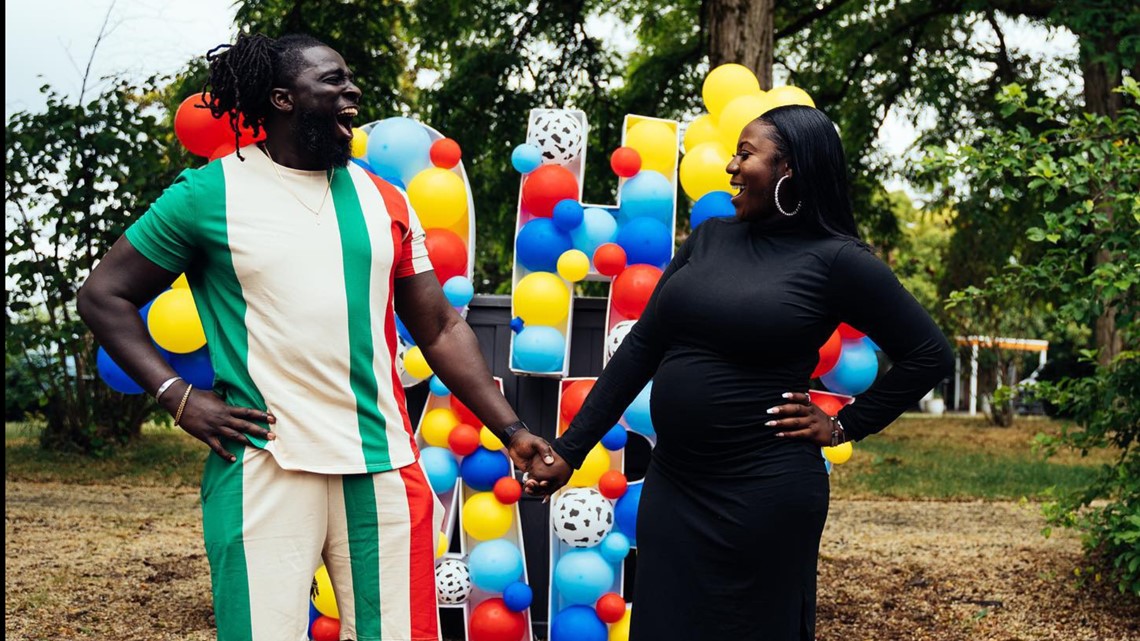
“I realized now that advocating for a team that felt like me, or at least could relate to the things that I want, it was really important.”
-Keisha Credit, expecting mother
Keisha Credit and her partner Adama will welcome a baby boy in July.
“The preparedness has been awesome, talking about things before they occur, having a birth plan before it's time, getting prepared months ahead of time so that whatever shifts happens in your body or with a baby or whatever, you're not blindsided," Credit said.
Credit has felt blindsided before. She knows what it’s like to not be heard by a doctor and to have to fight for what she needs.
"I'm always like, you have to listen to yourself," Credit said. "You have to have that connection with your body because if not, no one else can feel what you feel. So, when it came to pregnancy, I had that memory in the back of my mind of, you know how to advocate for yourself do that here.”
Credit wanted to build a safe environment, knowing the risks that can occur. Everyone on her care team is of color.
“In labor, you're in a moment where it's very tense," Credit said. "You're in pain, you're screaming, you've got your partner that's trying to support you. I think trying to explain nuances that may be cultural or having to feel as if you're not able to be truly yourself because you might be in a room full of people that don't resemble you, or you feel may not be as empathetic to who you are. I think building that environment where it's just natural, it flows, you have familiarity with these people. To me, that seemed like the most opportune moment for me to bring a child into the world."
Credit encouraged all moms to create their village and not be afraid to ask for what they need.
“You are not limited to what you're given," Credit said. "I think in healthcare, sometimes it can feel like you're limited to what you're given, that's never the case and so feel empowered enough to make those decisions for yourself."

